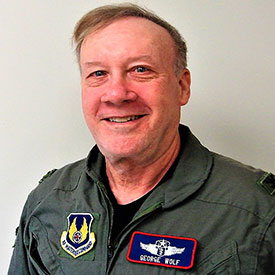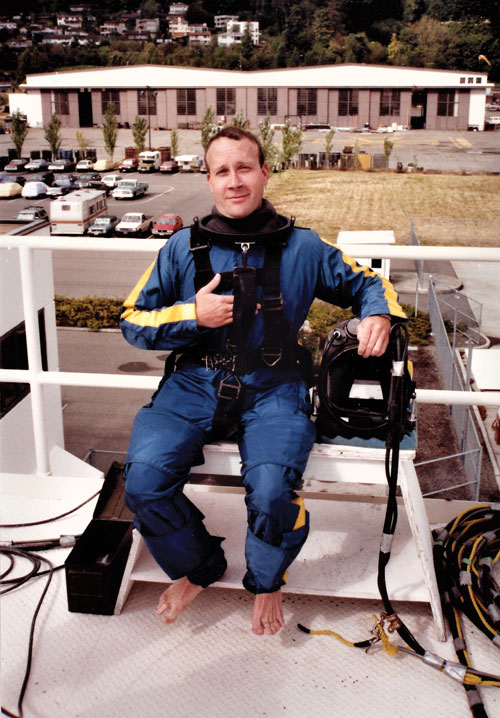 From flying with famed journalist Walter Cronkite through the aurora borealis in Canada to working with NASA scientists on space shuttle landings, E. George Wolf Jr., M.D. ’77, UHM, enjoyed an eventful 23-year career in the U.S. Air Force. As a flight surgeon and specialist in aerospace medicine (ASM) and undersea and hyperbaric medicine (UHM), he worked around aircraft and flight crews his entire career.
From flying with famed journalist Walter Cronkite through the aurora borealis in Canada to working with NASA scientists on space shuttle landings, E. George Wolf Jr., M.D. ’77, UHM, enjoyed an eventful 23-year career in the U.S. Air Force. As a flight surgeon and specialist in aerospace medicine (ASM) and undersea and hyperbaric medicine (UHM), he worked around aircraft and flight crews his entire career.
“It has been a very interesting and rewarding career, because I love what I’m doing,” says Wolf, currently a contractor working in the UHM clinic at Brooke Army Medical Center and Wilford Hall Ambulatory Care Center in San Antonio. “That’s all anybody can ask for from a job.”
ASM is 60% family medicine and 40% a combination of bioenvironmental engineering, occupational medicine, and public health, according to Wolf. “We take care of all our pilots, navigators, aircrew, and their respective families like you would in family practice,” he explains. “Bioenvironmental engineers use engineering principles to reduce and solve environmental health risks. The occupational medicine factor comes from working with pilots and flight crews to keep them healthy. From a public health perspective, we even inspect dining facilities.”
 E. George Wolf prepares for a hard helmet dive at a National Oceanic and Atmospheric Administration Dive Course during his undersea and hyperbaric medicine fellowship.While attending The University of Alabama (UA) for undergrad, Wolf followed in his grandfather’s and father’s footsteps by joining the military. His grandfather served in the U.S. Navy, while his father was a surgeon in the Navy during World War II and served in the Air Force Reserve as a flight surgeon. Wolf joined the Air Force ROTC during the Vietnam War. “The other cadets became like my fraternity brothers going through school,” notes Wolf, who graduated from UA in 1974 with a bachelor’s degree in chemistry.
E. George Wolf prepares for a hard helmet dive at a National Oceanic and Atmospheric Administration Dive Course during his undersea and hyperbaric medicine fellowship.While attending The University of Alabama (UA) for undergrad, Wolf followed in his grandfather’s and father’s footsteps by joining the military. His grandfather served in the U.S. Navy, while his father was a surgeon in the Navy during World War II and served in the Air Force Reserve as a flight surgeon. Wolf joined the Air Force ROTC during the Vietnam War. “The other cadets became like my fraternity brothers going through school,” notes Wolf, who graduated from UA in 1974 with a bachelor’s degree in chemistry.
Wolf earned his medical degree from the UAB School of Medicine in 1977 and a master’s degree in aerospace medicine from Wright State University in June 1982. After a flight surgeon course in 1979, Wolf encountered a career turning point when he completed a compression chamber team training course with hyperbaric chambers—think of a high-altitude version of the “bends” or decompression sickness that occurs in scuba divers. He completed the Aerospace Medicine Residency at Brooks Air Force Base in San Antonio in June 1983 and spent another year at Brooks AFB in the UHM Fellowship from July 1989-June 1990.
“During the space age, people started doing altitude chamber testing for the space program and learned you could actually die from altitude decompression sickness,” says Wolf. “Hyperbaric oxygen therapy is breathing 100% oxygen under pressure. At an equivalent pressure of 66 feet of sea water, there is enough oxygen dissolved in the plasma, you don’t need red blood cells. This principle allows for 14 indications for treatment, such as carbon monoxide poisoning, as well as traumatic brain injury and post-traumatic stress disorder research. That’s why it’s important that we are fellowship trained.”
Wolf retired from the military in 2000, but he has worked with the UHM program at Lackland Air Force Base and now at the Brooke Army Medical Center since 2007. “UAB laid down a superb science and clinical foundation for my unique vocation that I will always revere,” he says. “The family support I had from my wife, Kris, also a retired USAF colonel, and our children Stephen and Laura was also critical for my career.”
For the past two years, Wolf has worked under William Hayes II, D.O., an active-duty lieutenant colonel in the Air Force and the associate program director for the Hyperbaric Medicine Fellowship. “He’s a very comforting presence,” says Hayes. “He’s also an exemplary human being as far as ethics, morality, and his approach to patient care.”
By Ryan Broussard